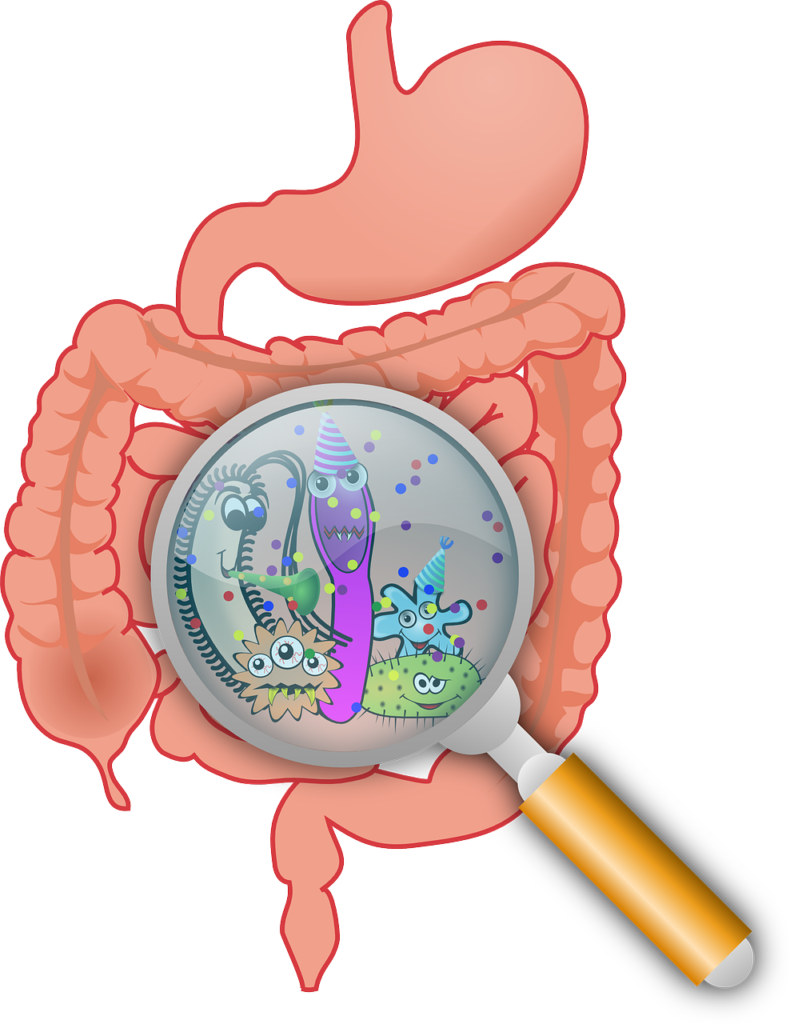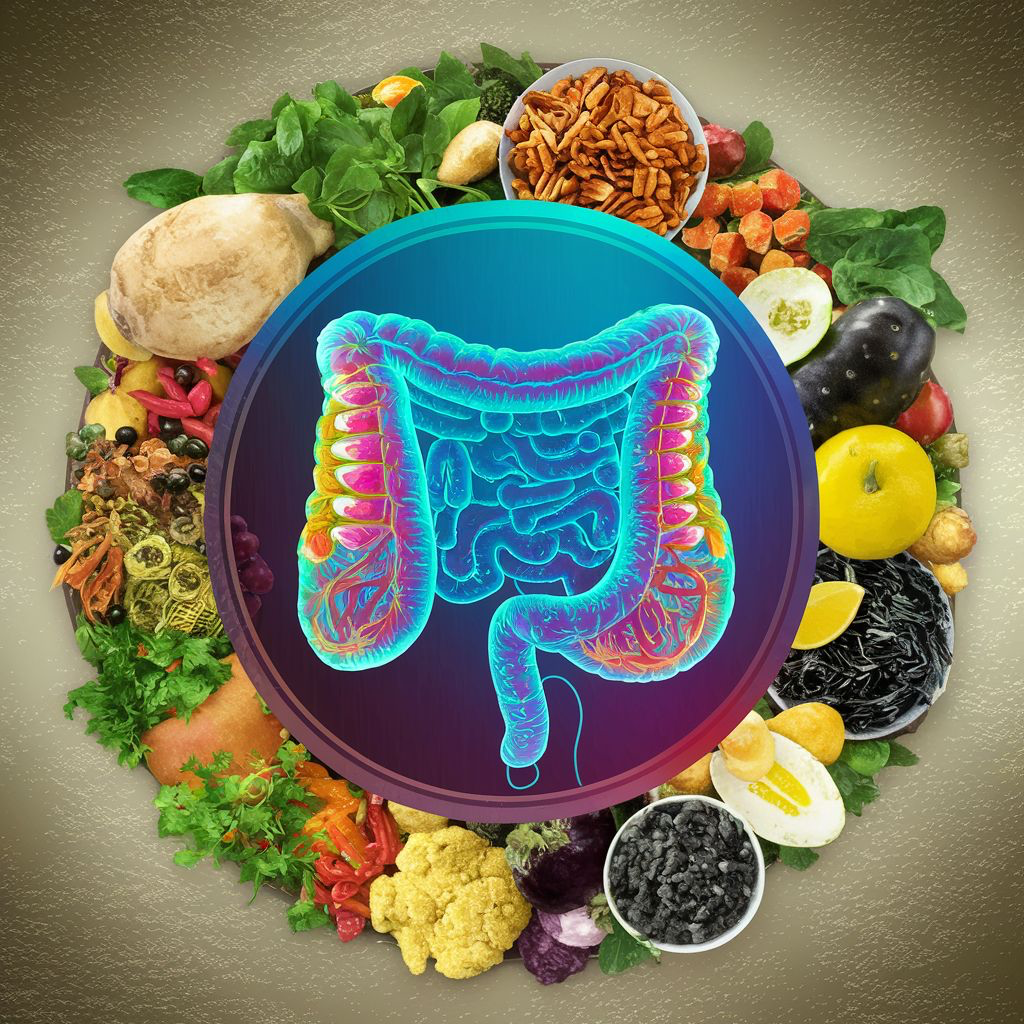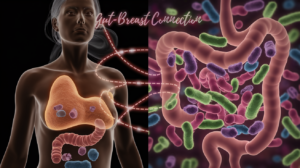Table of Contents
Introduction
When you think about your health, what comes to mind? Perhaps you consider your heart, your brain, or your immune system. But there is another crucial player in the game of health that often goes overlooked: your gut.
What is Gut Health?
Gut health has become an important topic in recent years, but what does it really mean?
Gut health refers to the balance and function of the gastrointestinal (GI) tract. It encompasses the health of all parts of the digestive system, including the oesophagus, stomach, and intestines. But it is far more than just a digestive tube, your gut is home to trillions of microorganisms that play a vital role in your overall well-being and are central to gut health.
This ecosystem is changing our understanding of health and disease.
In this article, I will explore the world of gut health and why it matters so much. From influencing your mood to boosting your immune system, from managing your weight to potentially preventing chronic diseases, your gut does it all.
So, let us discover why taking care of your gut might be one of the best things you can do for your health.
Understanding the Gut Microbiome
To appreciate the importance of gut health, we first need to understand what the gut microbiome is and how it functions. The gut microbiome refers to the vast community of microorganisms that reside in our gastrointestinal tract, primarily in the large intestine. This complex ecosystem consists of approximately 39 trillion microorganisms, representing thousands of species of bacteria, along with viruses, fungi, and archaea.
The composition of the gut microbiome is unique to each individual, influenced by factors such as genetics, diet, environment, and lifestyle. This microbial fingerprint begins to form at birth and continues to evolve throughout our lives. The primary residents of the gut microbiome are bacteria, with the two dominant phyla being Firmicutes and Bacteroidetes.
But what exactly does this microbial community do for us?
1. Digestion and nutrient absorption: Gut bacteria help break down complex carbohydrates that our bodies cannot digest on their own, producing short-chain fatty acids that nourish our gut cells.
2. Metabolism: Influencing metabolic processes and energy balance.
3. Vitamin synthesis: Certain gut bacteria produce essential vitamins, including vitamin K and several B vitamins.
4. Immune system regulation: The gut microbiome helps train and modulate our immune system, influencing how we respond to pathogens and potential allergens.
5. Barrier function: A healthy gut microbiome helps maintain the integrity of the intestinal barrier, preventing harmful substances from entering the bloodstream.
6. Mental Health: Neurotransmitter production. Gut bacteria produce neurotransmitters like serotonin, influencing mood and cognitive function.
7. Protection against pathogens: A healthy gut microbiome helps prevent harmful bacteria from taking hold.
Understanding the concept of dysbiosis is important when discussing gut health. Dysbiosis refers to an imbalance in the gut microbial community, often characterised by a loss of beneficial bacteria, an overgrowth of potentially harmful bacteria, or a loss of overall microbial diversity. This state of imbalance has been associated with various health issues, from digestive problems to autoimmune diseases and even mental health disorders.
The diversity of the gut microbiome is a key factor in its health-promoting effects. A diverse microbiome is generally associated with better health outcomes, while a lack of diversity—often referred to as dysbiosis—has been linked to various health issues.
Several factors can influence the diversity and composition of our gut microbiome:
- Diet: What we eat has a impact on our gut bacteria. A diet rich in diverse plant-based foods tends to promote a more diverse microbiome.
- Antibiotics: While sometimes necessary, antibiotics can dramatically alter the gut microbiome, potentially leading to long-term changes.
- Stress: Chronic stress can negatively impact the gut microbiome, potentially leading to dysbiosis.
- Exercise: Regular physical activity has been shown to promote a healthier, more diverse gut microbiome.
- Sleep: Sleep helps maintain a healthy balance of gut bacteria. Disrupted sleep can alter the composition and diversity of the microbiome.
- Age: Our gut microbiome changes as we age, with potential implications for health and longevity.
- Environment: Factors like where we live, our exposure to nature, and even our pets can influence our gut microbiome.
As we delve deeper into the various ways the gut microbiome influences our health, keep in mind this fundamental concept: a diverse, balanced gut microbiome is key to overall health, while dysbiosis can contribute to a wide range of health problems.
Recommended book: Food for Life by Tim Spector

The Gut-Brain Connection
One of the most fascinating areas of gut health research is the exploration of the gut-brain axis—a bidirectional communication system between the gastrointestinal tract and the central nervous system. This complex network involves neural, endocrine, and immune pathways, allowing for constant dialogue between our gut and our brain.
You have probably experienced this connection firsthand. Ever had “butterflies” in your stomach when you are nervous? Or felt nauseous during times of stress? That is your gut-brain axis in action.
The concept of the gut-brain axis has changed our understanding of how the gut influences not just our physical health, but our mental and emotional well-being as well. Here is how this intricate system works:
- Neural Communication: The gut has its own nervous system, often referred to as the “second brain” or the enteric nervous system. This network of neurons communicates directly with the brain via the vagus nerve, sending signals back and forth.
- Endocrine Signalling: The gut produces various hormones and neurotransmitters that can affect brain function. For instance, about 95% of the body’s serotonin, a neurotransmitter associated with mood regulation, is produced in the gut.
- Immune Signalling: The gut houses a large portion of our immune system. Immune cells in the gut can produce signalling molecules that affect brain function and behavior.
- Microbial Metabolites: Gut bacteria produce various metabolites, including short-chain fatty acids, that can influence brain function and behavior.
One of the most striking aspects of the gut-brain axis is the role of gut bacteria in neurotransmitter production. As mentioned earlier, the majority of the body’s serotonin is produced in the gut. But that’s not all—gut bacteria are also involved in the production or regulation of other neurotransmitters, including dopamine, GABA, and norepinephrine. These neurotransmitters play crucial roles in mood regulation, cognitive function, and even pain perception.
The implications of this gut-brain connection for mental health are important. Research has shown associations between gut microbiome composition and various mental health conditions, including:
1. Depression: Studies have found differences in the gut microbiome composition of individuals with depression compared to healthy controls.
2. Anxiety: Certain probiotic strains have shown promise in reducing symptoms of anxiety in both animal and human studies.
3. Stress Response: The gut microbiome appears to play a role in modulating our stress response, potentially influencing our resilience to stress-related disorders.
4. Autism Spectrum Disorders: Some research suggests a link between gut microbiome composition and autism spectrum disorders, although more study is needed in this area.
Beyond mental health, emerging research is exploring the potential role of the gut microbiome in neurodegenerative diseases. While this field is still in its early stages, some intriguing findings include:
Parkinson’s Disease: Some studies have found differences in the gut microbiome of Parkinson’s patients compared to healthy individuals. There is also evidence that gut bacteria might be involved in the aggregation of alpha-synuclein, a protein associated with Parkinson’s.
Alzheimer’s Disease: Research has shown associations between certain gut bacteria and the development of amyloid plaques in the brain, a hallmark of Alzheimer’s disease.
Multiple Sclerosis: Some studies suggest that gut bacteria might influence the immune response involved in multiple sclerosis.
While much of this research is still in its early stages, it opens up exciting possibilities for new approaches to treating and potentially preventing these devastating diseases.
The gut-brain axis underscores the holistic nature of our health—our mental and cognitive well-being is intimately connected to the health of our gut.
Gut Health and Immune Function
The connection between gut health and immune function is one of the most well-established areas of microbiome research. In fact, the gut is often referred to as the largest immune organ in the body. This is because the gut-associated lymphoid tissue (GALT) houses about 70% of the body’s immune cells.
The relationship between the gut microbiome and the immune system is complex and bidirectional. On the one hand, the gut microbiome plays a crucial role in the development and function of the immune system. On the other hand, the immune system helps manage the microbial population in the gut.
- Immune System Development: From birth, our gut microbiome helps train our immune system. The presence of diverse microbes in the gut stimulates the development of various immune cells and helps the immune system learn to distinguish between harmful pathogens and benign or beneficial microbes.
- Barrier Function: A healthy gut microbiome helps maintain the integrity of the intestinal barrier. This barrier prevents harmful substances from entering the bloodstream, which is crucial for preventing excessive immune activation and inflammation.
- Immune Modulation: Gut bacteria produce various compounds that can modulate immune function. For example, short-chain fatty acids produced by gut bacteria have anti-inflammatory effects and can influence the development and function of regulatory T cells, which are crucial for maintaining immune balance.
- Pathogen Resistance: A diverse, healthy gut microbiome can help prevent colonisation by harmful pathogens through competition for resources and the production of antimicrobial compounds.
The intricate relationship between the gut microbiome and the immune system has significant implications for various aspects of health, including autoimmune diseases and allergies.
Autoimmune diseases, where the immune system mistakenly attacks the body’s own tissues, have been increasingly linked to gut health. Research has shown associations between gut microbiome composition and various autoimmune conditions, including:
1. Inflammatory Bowel Disease (IBD): Both Crohn’s disease and ulcerative colitis, the two main forms of IBD, have been associated with alterations in the gut microbiome.
2. Rheumatoid Arthritis: Studies have found differences in the gut microbiome of individuals with rheumatoid arthritis compared to healthy controls.
3. Type 1 Diabetes: Some research suggests that gut microbiome composition in early life might influence the risk of developing type 1 diabetes.
4. Multiple Sclerosis: As mentioned earlier, there is growing evidence of a link between gut bacteria and the immune response involved in multiple sclerosis.
The connection between gut health and allergies is another area of intense research. The “hygiene hypothesis” proposes that a lack of early childhood exposure to diverse microbes may contribute to the development of allergies and other immune-related disorders.
This hypothesis is supported by observations that children growing up on farms or with pets tend to have lower rates of allergies and asthma. It is thought that exposure to a diverse range of microbes helps train the immune system to respond appropriately to potential allergens.
Research has expanded on this idea, suggesting that it is not just about exposure to environmental microbes, but also about nurturing a diverse gut microbiome. Some studies have found associations between early-life antibiotic use (which can disrupt the gut microbiome) and increased risk of allergies and asthma later in life.
Certain gut bacteria have been associated with protection against food allergies. For example, some studies have found that infants with low levels of certain Bifidobacterium and Bacteroides species are more likely to develop food allergies.
The intricate relationship between the gut microbiome and the immune system underscores the importance of maintaining a healthy, diverse gut ecosystem. By nurturing our gut health, we may be able to support a well-functioning immune system, potentially reducing the risk of autoimmune diseases and allergies.
Gut Health and Chronic Diseases
Inflammation and Chronic Diseases
Chronic inflammation is at the root of many diseases, and gut health plays an important role in managing inflammation.
Anti-inflammatory compounds: Beneficial gut bacteria produce SCFAs that have anti-inflammatory properties.
Gut Permeability: A healthy gut lining prevents “leaky gut,” where toxins and bacteria can leak into the bloodstream, causing inflammation.
The influence of the gut microbiome extends far beyond digestion and metabolism. Emerging research is uncovering links between gut health and various chronic diseases, including cardiovascular disease, type 2 diabetes, inflammatory bowel diseases, and even colorectal cancer. Understanding these connections could open up new avenues for prevention and treatment of these conditions.
Cardiovascular Disease:
The gut microbiome has been increasingly recognised as a potential factor in cardiovascular health. Several mechanisms have been proposed:
- Trimethyleamine N-oxide (TMAO) production: Some gut bacteria produce trimethylamine (TMA) from certain dietary components. TMA is then converted to TMAO in the liver. High levels of TMAO have been associated with an increased risk of cardiovascular events.
- Inflammation: Certain gut bacteria can produce pro-inflammatory compounds, while others produce anti-inflammatory substances. The balance of these can influence systemic inflammation, a key factor in cardiovascular disease.
- Cholesterol Metabolism: Some gut bacteria can influence cholesterol levels by affecting bile acid metabolism.
- Blood Pressure Regulation: Certain gut bacteria produce short-chain fatty acids that may help regulate blood pressure.
Type 2 Diabetes:
The gut microbiome appears to play a role in the development and progression of type 2 diabetes:
- Insulin Resistance: The gut microbiome can influence insulin sensitivity. Dysbiosis has been associated with increased insulin resistance, a key feature of type 2 diabetes.
- Inflammation: Chronic low-grade inflammation, which can be influenced by the gut microbiome, is a characteristic of type 2 diabetes.
- Metabolism: Some gut bacteria can influence how our bodies metabolise glucose, potentially affecting blood sugar levels.
- Incretin Production: Gut bacteria can influence the production of incretin hormones, which play a role in insulin secretion and glucose homeostasis.
Inflammatory Bowel Diseases (IBD):
- Microbial Imbalance: Patients with IBD often show significant alterations in their gut microbiome composition, including reduced diversity and changes in the abundance of certain bacterial species.
- Barrier Function: A healthy gut microbiome helps maintain the integrity of the intestinal barrier. Disruption of this barrier is a key feature of IBD.
- Immune Regulation: The gut microbiome plays a crucial role in regulating the immune response in the gut. Dysregulation of this process is thought to contribute to the development of IBD.
- Short-Chain Fatty Acids: Some gut bacteria produce short-chain fatty acids that have anti-inflammatory effects and help maintain gut health. Reduced levels of these bacteria have been observed in IBD patients.
Colorectal Cancer:
The gut microbiome has also been implicated in the development of colorectal cancer:
- Inflammation: Chronic inflammation in the gut, which can be influenced by the microbiome, is a risk factor for colorectal cancer.
- Genotoxins: Some gut bacteria can produce genotoxins that can damage DNA and potentially contribute to cancer development.
- Bile Acid Metabolism: Certain gut bacteria can convert primary bile acids into secondary bile acids, some of which have been associated with an increased risk of colorectal cancer.
- Butyrate Production: Butyrate, a short-chain fatty acid produced by some gut bacteria, has anti-inflammatory and potentially anti-cancer effects. Reduced levels of butyrate-producing bacteria have been observed in colorectal cancer patients.
Several gut bacteria have been implicated in the development and progression of colorectal cancer (CRC). Some of the most notable ones include:
1.Fusobacterium nucleatum: This bacterium has been frequently found at higher levels in colorectal cancer tissues compared to normal tissues. It is believed to promote tumour growth by affecting immune responses and cellular adhesion mechanisms.
2.Bacteroides fragilis: The enterotoxigenic strain of B. fragilis (ETBF) produces a toxin that can induce inflammation and has been associated with colorectal carcinogenesis.
3. Escherichia coli: Certain strains of E. coli, particularly those producing colibactin toxin, have been associated with DNA damage and potential cancer development.
4.Streptococcus gallolyticus: This bacterium has been associated with an increased risk of colorectal cancer, and its presence in the gut has been linked to the progression of adenomas to carcinomas.
5.Clostridium septicum: Infections with this bacterium have been associated with colorectal cancer, although the exact mechanisms are not entirely clear.
6.Peptostreptococcus anaerobius: This bacterium has been found to be enriched in colorectal cancer patients and is believed to promote tumorigenesis through its metabolic byproducts and interactions with the host immune system.
These bacteria can influence colorectal cancer through various mechanisms, including inducing chronic inflammation, producing toxins that damage DNA, modulating the immune system, and altering the gut microbiome composition in ways that favour tumor growth.
The connections between gut health and these chronic diseases underscore the far-reaching effects of our gut microbiome on our overall health. While much of this research is still in its early stages, it suggests that maintaining a healthy gut microbiome could be an important strategy in preventing and potentially treating these conditions.
Understanding these connections could lead to new strategies for preventing and treating these chronic diseases. For example, researchers are exploring the potential of faecal microbiota transplantation (transferring faecal matter from a healthy donor to a recipient) as a treatment for various conditions.
Metabolism and Weight Management
Your gut microbiome does not just influence your immune system and mental health — it also plays a significant role in your metabolism and weight management. Here is how:
1. Nutrient Absorption: Different gut bacteria are better at extracting nutrients from food. The composition of your gut microbiome can influence how many calories you absorb from what you eat.
2. Appetite Regulation: Gut bacteria can influence the production of hormones that regulate hunger and fullness.
3. Fat Storage: Some gut bacteria may influence how your body stores fat.
4. Blood Sugar Control: The gut microbiome can affect how your body responds to insulin, influencing blood sugar levels.
Research has shown differences in the gut microbiome composition between obese and lean individuals. Some studies have even found that transferring gut bacteria from obese mice to lean mice can lead to weight gain in the recipients, suggesting a causal role for gut bacteria in weight regulation.
This connection between gut health and metabolism opens up exciting possibilities for personalised approaches to weight management and metabolic health. In the future, we may be able to tailor dietary recommendations based on an individual’s unique gut microbiome composition.
Skin Health
Connection Between Gut and Skin
The gut-skin axis highlights the connection between gut health and skin conditions:
– Eczema and Psoriasis: Gut dysbiosis is linked to inflammatory skin conditions.
– Acne: Gut health can influence the balance of skin microbiota and inflammation levels.
Hormonal Balance
The Estrobiome and Women’s Health
The gut microbiome helps regulate the metabolism of hormones such as:
-Oestrogen: Gut bacteria can influence the metabolism of oestrogen.
– Cortisol: Stress and gut health are interconnected, affecting cortisol levels and stress response.
An emerging area of gut health research is the “estrobiome” — the collection of gut bacteria capable of metabolising oestrogens. This subset of the gut microbiome plays a crucial role in women’s health, influencing oestrogen levels and potentially impacting various oestrogen-related conditions.
The estrobiome can affect:
1. Estrogen Regulation: Influencing the amount of oestrogen that is reabsorbed or excreted from the body.
2. Breast Cancer Risk: Some studies suggest that an imbalanced estrobiome might contribute to increased breast cancer risk.
3. Menopause Symptoms: The composition of the estrobiome may influence the severity of menopause symptoms.
4. Conditions like endometriosis and polycystic ovary syndrome (PCOS)
Understanding and nurturing the estrobiome opens up new possibilities for managing women’s health issues. Future treatments might involve targeted probiotics or dietary interventions to optimse the estrobiome.
Brain Development and Function
Early Life and Cognitive Development
– Infant Microbiome: Early gut microbiome composition influences cognitive development and immune function.
– Cognitive Function: Gut health impacts learning, memory, and the risk of neurodegenerative diseases.
The Leaky Gut Syndrome
An important concept in gut health is “leaky gut syndrome,” also known as increased intestinal permeability. While not yet fully accepted as a medical diagnosis, this condition has gained significant attention in both scientific research and popular health discussions.
The intestinal lining is designed to form a tight barrier, controlling what enters the bloodstream. In leaky gut syndrome, this barrier becomes compromised, potentially allowing partially digested food particles, toxins, and bacteria to “leak” into the bloodstream.
Factors Contributing to Leaky Gut
Several factors can compromise the integrity of the gut barrier, leading to leaky gut:
-Dietary Factors: High consumption of sugar, refined carbohydrates, processed foods, and food additives like emulsifiers can damage the gut lining.
-Chronic Stress: Stress can affect gut permeability by altering gut microbiota and increasing the release of cortisol, which impacts the tight junctions.
– Infections: Bacterial, viral, and fungal infections can disrupt the gut barrier through direct damage or by inducing inflammation.
– Medications: Prolonged use of nonsteroidal anti-inflammatory drugs (NSAIDs), antibiotics, and certain other medications can harm the gut lining.
– Alcohol and Smoking: Both can increase intestinal permeability and disrupt gut microbiota.
Tight Junction Dysfunction
Tight junctions are crucial for maintaining gut barrier integrity. Several molecular mechanisms can lead to their dysfunction:
– Inflammatory Cytokines: Molecules like TNF-α, IL-1β, and IL-6 released during inflammation can disrupt tight junctions.
– Zonulin Pathway: Zonulin is a protein that modulates tight junctions. Its overexpression, often triggered by gluten and bacterial overgrowth, can increase gut permeability.
– Oxidative Stress: Reactive oxygen species (ROS) can damage cellular structures, including tight junctions, leading to increased permeability.
Microbiota Imbalance
A healthy gut microbiota supports the integrity of the gut barrier. Dysbiosis, an imbalance in gut microbiota, can:
– Reduce production of Short-Chain Fatty Acids (SCFAs): Beneficial bacteria produce SCFAs like butyrate, which strengthen the gut lining. Dysbiosis can reduce SCFA production.
– Increase pathogenic bacteria: Overgrowth of harmful bacteria can produce toxins and metabolites that damage the gut lining.
When incompletely digested food particles and toxins enter the bloodstream, they can trigger an immune response. This may lead to inflammation throughout the body and has been associated with a range of health issues, including autoimmune diseases, food sensitivities, and even mood disorders.
While more research is needed to fully understand leaky gut syndrome, maintaining overall gut health may help prevent this condition.
The Gut-Liver axis
The gut-liver axis refers to the bidirectional communication between the intestine, its microbiome, and the liver. This relationship has several key aspects:
1. Anatomical connection: The liver receives most of its blood supply from the intestine via the portal vein, allowing for direct transport of nutrients and other substances from the gut to the liver.
2. Bile acids: The liver produces bile acids that are released into the intestine. These bile acids help with fat absorption and also shape the gut microbiome due to their antimicrobial properties.
3. Microbial influence: Gut microbes can modify bile acids, which then return to the liver and regulate bile acid production. Additionally, microbial metabolites and molecules can affect liver function and potentially contribute to liver disease progression.
4. Immune interactions: The gut and liver work together to maintain immune homeostasis and prevent the spread of harmful microbes or their products.
5. Barrier function: Both the intestinal epithelium and the liver act as barriers to restrict the dissemination of microorganisms and their products.
6. Disease implications: Disruptions in the gut-liver axis have been linked to various liver diseases, including non-alcoholic fatty liver disease, alcohol-related liver disease, and cirrhosis.
Understanding the gut-liver axis is vital for developing new therapeutic approaches for liver diseases, including microbiome-based strategies, metabolite-targeted interventions, and treatments aimed at restoring intestinal barrier function.
The gut-liver axis is essential for maintaining health, influencing metabolism, detoxification, and immune functions. Understanding it can enhance prevention and treatment of various diseases.
The Gut-Lung axis
The gut-lung axis refers to the bidirectional communication between the gastrointestinal tract and the respiratory system. This connection plays a crucial role in maintaining overall health and influencing various physiological processes.
Key aspects of the gut-lung axis include:
1. Immune system regulation: The gut microbiome helps modulate immune responses in both the gut and lungs, affecting susceptibility to respiratory infections and inflammatory conditions.
2. Microbial interactions: Gut microbes can influence lung health through the production of metabolites and other signalling molecules that travel through the bloodstream.
3. Shared mucosal immune system: The gut and lungs are part of a common mucosal immune system, allowing for cross-talk between these organs.
4. Inflammation: Gut dysbiosis can lead to systemic inflammation, potentially affecting lung function and respiratory health.
5. Dietary influences: Nutrition plays a vital role in shaping both gut and lung microbiomes, which can impact respiratory health.
6. Potential therapeutic applications: Understanding the gut-lung axis may lead to new treatments for respiratory conditions, such as using probiotics or dietary interventions to improve lung health.
Research in this area is ongoing, and scientists are exploring how manipulating the gut microbiome might help prevent or treat respiratory diseases. The gut-lung axis highlights the interconnected nature of our body systems and emphasises the importance of maintaining a healthy gut for overall well-being, including respiratory health.
The gut-lung axis is vital for maintaining immune balance and health. Understanding this connection can help in developing strategies to prevent and treat respiratory and gastrointestinal diseases.

Signs of Poor Gut Health
Recognising the symptoms of poor gut health can help you take proactive steps to address and improve your digestive well-being. Common signs include:
– Digestive Discomfort: Bloating, gas, constipation, diarrhea, and heartburn.
– Chronic Fatigue: Persistent tiredness that is not alleviated by rest.
– Food Intolerances: Difficulty digesting certain foods, leading to symptoms like nausea, gas, cramps, or diarrhea.
– Unintentional Weight Changes: Sudden weight gain or loss without changes in diet or exercise.
– Skin Issues: Conditions like eczema, acne, or rashes.
– Autoimmune Conditions: Gut health can influence the development and progression of autoimmune diseases.
– Mental Health Issues: Anxiety, depression, and mood swings can be linked to gut health through the gut-brain axis.
– Frequent Infections: A compromised immune system due to poor gut health can lead to increased susceptibility to infections.

Nurturing Your Gut Health
Given the impact of gut health on overall well-being, it is crucial to understand how to nurture a healthy gut microbiome. Here are some key strategies:
Eat a Diverse Diet:
Consuming a wide variety of foods can lead to a more diverse microbiome, which is beneficial for gut health:
– Fruits and Vegetables: Aim for a variety of colours to get a range of nutrients and prebiotics.
– Whole Grains: Brown rice, quinoa, oats, barley, and whole wheat products.
– Legumes: Beans, lentils, chickpeas, and peas.
– Nuts and Seeds: Almonds, walnuts, flaxseeds, chia seeds, and hemp seeds.
Fibre-Rich Foods
Fibre is essential for feeding the beneficial bacteria in your gut. Aim to include both soluble and insoluble fibre in your diet:
– Soluble Fibre: Found in oats, beans, lentils, apples, and carrots. It helps to regulate blood sugar levels and can lower cholesterol.
– Insoluble Fibre: Found in whole grains, nuts, and vegetables. It adds bulk to stool and helps food pass more quickly through the stomach and intestines.
Consume Fermented Foods:
Fermented foods are rich in probiotics, which are beneficial bacteria that can help balance the gut microbiome:
– Yoghurt: Choose plain, unsweetened yoghurt with live cultures.
– Kefir: A fermented milk drink that contains a variety of beneficial bacteria and yeasts.
– Sauerkraut: Fermented cabbage that is rich in probiotics.
– Kimchi: A spicy Korean dish made from fermented vegetables.
– Miso: A fermented soybean paste used in Japanese cuisine.
– Tempeh: A fermented soybean product that is a good source of protein.
– Kombucha: A fermented tea drink that contains probiotics.
Eat Prebiotic Foods:
Prebiotics are types of fibre that feed the friendly bacteria in your gut. Include these prebiotic-rich foods in your diet:
– Garlic: Contains inulin, a type of prebiotic fibre.
– Onions: Also a good source of inulin.
– Bananas: Especially unripe bananas, which contain resistant starch.
– Asparagus: High in prebiotic fibre.
– Leeks: Similar to onions and garlic, they contain inulin.
– Chicory Root: Often used as a coffee substitute and is very high in inulin.
– Jerusalem Artichokes: Also known as sunchokes, they are high in inulin.
Consider Probiotic Supplements: While it’s best to consult with a healthcare provider before starting any supplement regimen, probiotic supplements can be beneficial for some people. These can help reintroduce beneficial bacteria into the gut, especially after antibiotic use. Look for strains like Lactobacillus and Bifidobacterium.
Digestive Enzymes: These can assist in breaking down food and improving nutrient absorption, particularly for individuals with digestive disorders like lactose intolerance or pancreatic insufficiency.
These supplements can aid in breaking down food and improving nutrient absorption, especially for individuals with digestive disorders.
Types of Enzymes: Look for enzymes like amylase, protease, lipase, and lactase, which help digest carbohydrates, proteins, fats, and lactose, respectively.
Healthy Fats
Incorporate healthy fats into your diet, which can reduce inflammation and support gut health:
– Omega-3 Fatty Acids: Found in fatty fish (salmon, mackerel, sardines), flaxseeds, chia seeds, and walnuts.
– Monounsaturated Fats: Found in olive oil, avocados, nuts, and fish oil supplements, these have anti-inflammatory properties that can benefit gut health.
L-Glutamine: An amino acid that supports the integrity of the gut lining and can be particularly beneficial for individuals with leaky gut syndrome.
Limit Ultra Processed Foods and Added Sugars: These can negatively impact the gut microbiome.
Manage Stress:
Chronic stress can negatively impact gut health. Adopt stress-reducing techniques:
– Mindfulness and Meditation: Practices that promote relaxation and reduce stress.
– Deep Breathing Exercises: Help to calm the nervous system.
– Engage in Hobbies: Activities that you enjoy can reduce stress levels.
Adequate Sleep: Poor sleep has been associated with changes in the gut microbiome. Aim for 7-9 hours of quality sleep per night.
Avoid Unnecessary Antibiotics: While antibiotics are sometimes necessary, they can dramatically alter the gut microbiome. Only use them when prescribed by a healthcare provider.
Stay Hydrated: Proper hydration supports the mucosal lining of the intestines and promotes the balance of good bacteria in the gut.
Exercise Regularly:
Physical activity has been shown to promote the growth of beneficial gut bacteria.
– Aerobic Exercises: Such as walking, running, cycling, and swimming.
– Strength Training: Incorporate weight lifting or resistance exercises.
– Flexibility and Balance Exercises: Such as yoga and Pilates.
Avoid Smoking: Smoking can disrupt the balance of gut bacteria and damage the gut lining.
Avoiding Harmful Substances:
Excessive Alcohol: Limit alcohol intake, as it can harm the gut lining and microbiome balance.
Mindful Eating: Chew food thoroughly and eat slowly to aid digestion and prevent overeating.
Avoid Late-Night Eating: Give your digestive system a break by not eating too close to bedtime.
Read Labels: Be aware of hidden sugars, artificial sweeteners, and preservatives in packaged foods.
Cook at Home: Preparing meals at home allows you to control ingredients and avoid additives and preservatives.
Regular Health Check-Ups
Regular visits to healthcare professionals can help in early detection and management of gut-related issues. Diagnostic tests, such as stool analysis and gut microbiome profiling, can provide insights into your gut health.
Supplements
Probiotic Supplements
Probiotics are live microorganisms that can provide health benefits when consumed in adequate amounts. They can help restore the balance of gut bacteria, especially after antibiotic use.
– Look for Multiple Strains: A variety of strains like Lactobacillus and Bifidobacterium can offer broader benefits.
– CFU Count:Choose a supplement with a high colony-forming unit (CFU) count, typically in the billions.
Prebiotic Supplements
Prebiotics are non-digestible fibres that feed beneficial gut bacteria. They can be particularly useful if your diet lacks prebiotic-rich foods.
– Types of Prebiotics: Inulin, fructooligosaccharides (FOS), and galactooligosaccharides (GOS) are common prebiotics found in supplements.
In some cases, supplements can aid in maintaining or restoring gut health. However, it is important to consult a healthcare provider before starting any new supplement regimen.
Remember, changes to the gut microbiome can occur relatively quickly in response to dietary changes, but lasting changes typically require consistent habits over time.
The Future of Gut Health Research
As our understanding of the gut microbiome grows, so too does the potential for new therapies and interventions based on this knowledge. Here are some exciting areas of ongoing research:
1. Personalised Nutrition: By analysing an individual’s gut microbiome, we may be able to provide personalized dietary recommendations for optimal health.
2. Targeted Probiotics: Rather than general probiotics, research is moving towards developing probiotics with specific strains of bacteria targeted to treat particular conditions.
3. Faecal Microbiota Transplantation: This procedure, which involves transferring faecal matter from a healthy donor to a recipient, is being explored as a treatment for various conditions beyond its current use for recurrent C. difficile infections.
4. Microbiome-Based Diagnostics: The composition of the gut microbiome could potentially be used as a diagnostic tool for various health conditions.
5. Postbiotics: These are beneficial compounds produced by gut bacteria. Research is exploring the potential of directly administering these compounds as a therapeutic strategy.
While these areas of research are promising, they also present challenges and ethical considerations. The complexity of the gut microbiome, individual variations, and the need for long-term studies all pose challenges. Additionally, as we collect more data about individuals’ microbiomes, ensuring the privacy and ethical use of this sensitive information will be crucial.
Conclusion
The field of gut health research has exploded in recent years, revealing the impact that our gut microbiome has on our overall health and well-being. From influencing our mental health through the gut-brain axis to modulating our immune system and metabolism, from impacting women’s health through the estrobiome to potentially contributing to or protecting against chronic diseases, the trillions of microorganisms in our gut play a crucial role in keeping us healthy.
This holistic view of health, with the gut microbiome at its centre, represents a paradigm shift in how we think about human health and disease. It underscores the interconnectedness of our bodily systems and the importance of maintaining balance and diversity in our internal microbial ecosystem.
The good news is that while our gut microbiome is influenced by factors outside our control, like genetics and early life exposures, we have the power to nurture and support our gut health through our diet and lifestyle choices. By consuming a diverse range of plant-based foods, including fermented foods, fibre, prebiotics, managing stress, getting regular exercise, and avoiding harmful practices like unnecessary antibiotic use, we can promote a healthy, diverse gut microbiome.
As research in this field continues to advance, we can look forward to more personalised approaches to health based on our individual gut microbiome compositions. From tailored dietary advice to targeted probiotic treatments, the future of gut health holds exciting possibilities.
However, it is important to remember that gut health is just one piece of the overall health puzzle. While nurturing our gut microbiome is important, it should be part of a holistic approach to health that includes a balanced diet, regular physical activity, stress management, adequate sleep, and other healthy lifestyle practices.
As we continue to unravel the mysteries of the gut microbiome, one thing is clear: paying attention to our gut health is not just about digestive comfort—it is about supporting our overall health and well-being. So the next time you hear the phrase “trust your gut,” remember that nurturing those trillions of tiny inhabitants in your digestive tract might be one of the best things you can do for your health.
In the end, the saying “you are what you eat” takes on a whole new meaning when we consider the gut microbiome. Perhaps it is more accurate to say, “you are what your gut bacteria eat.” By taking care of our gut, we are not just supporting our digestive health—we are nurturing the foundation of our overall health and well-being.
This article is not intendedp to replace professional medical advice. If you have specific health concerns or conditions, consult with a healthcare professional for personalised guidance.
Disclaimer: The information provided in this article is for educational purposes only and should not be considered as medical advice. Always consult with a healthcare professional before making any changes to your diet or lifestyle.


